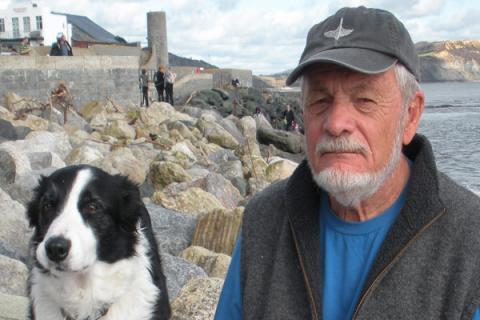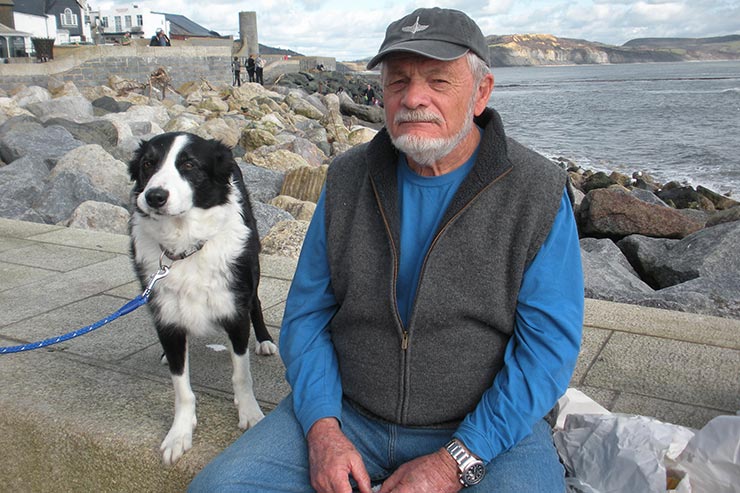

Brian Fagan’s 46th book explores the history of fishing.
By George Thurlow ’73
When Brian Fagan came to UC Santa Barbara as an anthropology professor he had never taught a class larger than 50 people.
In 1967, his first year at UCSB, he was given a class of 300 introductory anthropology students and no basic textbook.
Thirty-six years later when he retired, he had become a legendary lecturer introducing thousands of students to the mystery and insights of human behavior and the excavation of human history. He also produced the first general textbook in anthropology, “In the Beginning,” which is now in its 13th printing.
This year, the prolific writer who humbly said he was “a very good second rate excavator” of fossils, has produced his 46th book on human history: “Fishing: How the Sea Fed Civilization.”
His books have spanned the complete panoply of human history, from Egyptian archaeological history to the impact of global warming on human civilization.
Fagan’s life is both one of adventure and one of deep scholarship.
He was born in England and received his Ph.D. from Pembroke College, one of the University of Cambridge’s 31 autonomous colleges. He worked on the staff of a Zambian museum for six years, then moved to a research position in a Nairobi institute. During his time in Africa he did extensive field work and it was there that he first came across the mystery of the role of fish in human civilization.
He explained that on one field excavation in a Central African village some 60 years ago, an archaeologist came across fish bones among the human artifacts. He tossed them away as “useless.”
The problem then, and until very recently, was that fish bones are small and there was no way to identify what species they came from. Thus, the role of fish in human civilization was largely ignored among scholars and archaeologists.
Recently the ability to identify fish has advanced among researchers and that “useless” remark of 60 years ago helped set Fagan on a three year quest to discover what role fish have played in civilization.
His new book notes that while hunting and gathering, and later the domestication of livestock and plants set human civilization on its march to abundance, very little has been written about the role that fish played. While there are thousands of books on fishing, there are almost none about the history of the human race and its use of fish to feed its populations. It turns out, the role of fish was major.
“While there are thousands of books on fishing, there are almost none about the history of the human race and its use of fish to feed its populations.”
Fishing goes back, according to Fagan’s book, to pre-Neanderthal humans. The catch was catfish thousands of years ago. (This led to one of Fagan’s books entitled “How Catfish Created Civilization”). What has never changed is the way in which fish are harvested: hook, line and net. Same as 2,500 years ago. But the fish lines are now 60 miles long, according to Fagan, and fish have become the most traded food commodity in the world. Nowhere is this more apparent than in Asia, where Fagan said 48 percent of all consumed fish is farmed.
Ironically, Fagan does not count himself as a fisherman. It is the topic that fascinates him. As for the future, global warming will have an impact on our fisheries, on our source of protein and on the historical link between humans and the water that has produced such a bounty.
He scoffs at those who question global warming and its human causes, particularly after he wrote a history of El Nino. “There is no respectable scientist on earth that doesn’t recognize that the Earth is warming and humans are partially responsible.” He calls the arguments against human involvement as “political nonsense” that are held like “religious beliefs” that will not be swayed by scientific data or analysis.
When asked why scientists and historians like himself have not been more persuasive about global warming, Fagan lamented that science is a complex intellectual endeavor. One problem is that in universities there is no incentive to produce scientific writing aimed at the general public, rather the mandate of “publish or perish” pushes American scientists to work on narrowly defined topics and new knowledge. More importantly, “we haven’t trained or educated people to be scientists.” He added, “We haven’t rewarded scientists who are writing and doing popular science.”
Fagan takes on that task with fervor. He is going beyond his 300 students to a worldwide audience.
If you thought he had written on every possible topic, wait until you see his next book. It’s the history of beds.